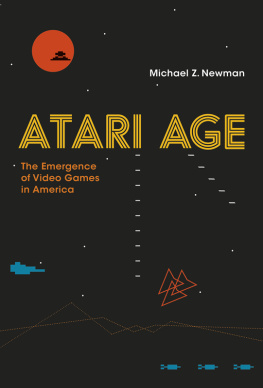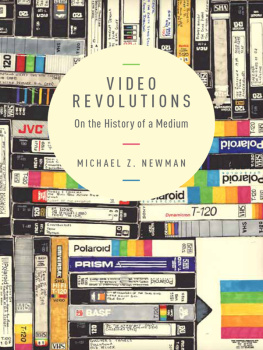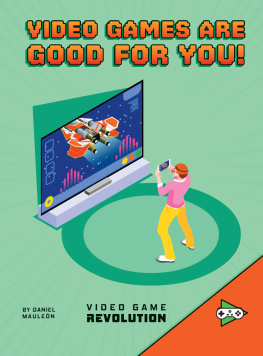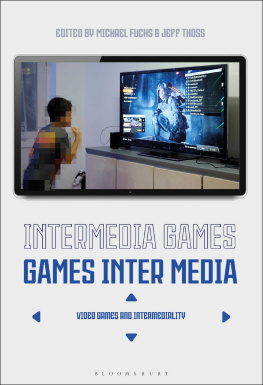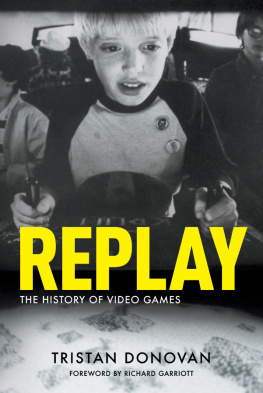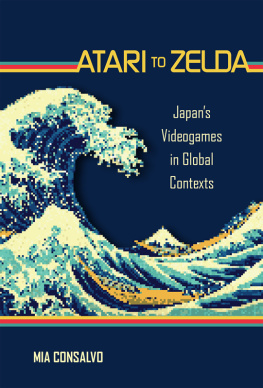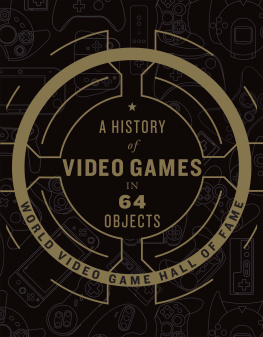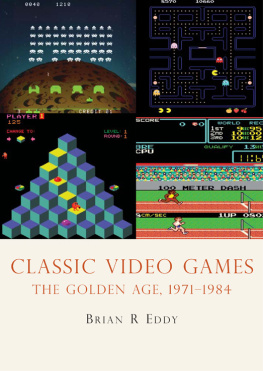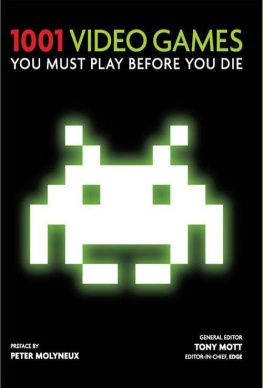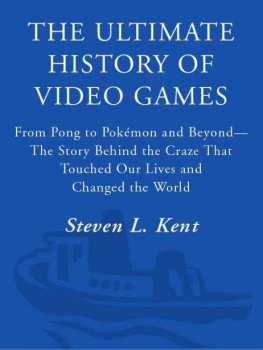Atari Age
The Emergence of Video Games in America
Michael Z. Newman
The MIT Press
Cambridge, Massachusetts
London, England
2017 Massachusetts Institute of Technology
All rights reserved. No part of this book may be reproduced in any form by any electronic or mechanical means (including photocopying, recording, or information storage and retrieval) without permission in writing from the publisher.
This book was set in Stone Sans and Stone Serif by Toppan Best-set Premedia Limited. Printed and bound in the United States of America.
Library of Congress Cataloging-in-Publication Data
Names: Newman, Michael Z., author.
Title: Atari age : the emergence of video games in America / Michael Z.
Newman.
Description: Cambridge, MA : MIT Press, [2017] | Includes bibliographical
references and index.
Identifiers: LCCN 2016028476 | ISBN 9780262035712 (hardcover : alk. paper)
eISBN 9780262338172
Subjects: LCSH: Video games--United States. | Video games industry--United
States.
Classification: LCC GV1469.3 .N484 2017 | DDC 794.8--dc23 LC record available at https://lccn.loc.gov/2016028476
ePub Version 1.0
Acknowledgments
So many people have helped me produce this book and I am grateful for many kinds of support from institutions, friends, family, and even people on the Internet I barely know.
For sharing their ideas, suggestions, research, or even just the name of someone else who might know the answer to a question, thank you Megan Ankerson, Catherine Baker, Anthony Bleach, Will Brooker, Rachel Donohoe, Christine Evans, Kevin Ferguson, Raiford Guins, Thomas Haigh, Carly Kocurek, Melanie Kohnen, David McGrady, Stuart Moulthrop, Sheila Murphy, Laine Nooney, Rebecca Onion, Tommy Rousse, Phil Sewell, Kent Smith, Colin Tait, Jacqueline Vickery, Ira Wagman, and Mark J. P. Wolf. Anonymous readers for the MIT Press offered outstanding feedback.
I am so happy to have found communities of scholars on Facebook and Twitter who answer questions and give advice. On Tumblr, I am thrilled to follow hundreds of people I do not know in real life who share images, videos, GIFs, and links. Even if I dont know you personally, your presence in my networks enriches my knowledge and experience every day.
Thanks are also due to a number of institutions and people who serve them. Ellen Engseth and other University of Wisconsin-Milwaukee archivists helped me get my hands on a treasure trove of department store catalogs. The Interlibrary Loan office of my campus library is doing Gods work, and I owe them more than I can offer here. UWMs Center for 21st Century Studies and its former director, Richard Grusin, were essential in helping me shape this project when it was getting started and giving me time to work on it. I could not have completed this work without an Arts & Humanities Travel Grant and a Graduate School Research Committee Award, and I am grateful for those forms of support. Librarians, archivists, and support staff at the International Center for the History of Electronic Games at The Strong, UCLA Film and Television Archive, and the Library of Congress aided me in many ways. Thanks in particular are due to J. P. Dyson, Thomas Hawco, and Lauren Sodano of The Strong/ICHEG, and Mark Quigley of UCLA.
At the MIT Press it has been my pleasure to work with Susan Buckley, Susan Clark, Judy Feldmann, Pamela Quick, and Doug Sery.
I want to acknowledge some of the sources of information that we all rely on and tend not to cite in our scholarly publications: Google Books, Google Scholar, Amazon look inside, and Wikipedia. I use these constantly to look things up. I often go to them even when sources I need are on the bookcase next to my desk or stored on the hard drive of my computer. Wikipedia in particular is so useful because so many volunteer editors have given generously of their time and knowledge, and anyone who ever wants facts quickly owes them their thanks.
In spring 2012 I taught a seminar on video games to graduate students, and I learned an amazing amount from its participants. Stephen Kohlmann, Alexander Marquardt, Pavel Mitov, Max Neibaur, Carey Peck, Leslie Peckham, and David Wooten, thanks for all of your contributions to our collective understanding of games and their history.
My colleagues in the Department of Journalism, Advertising, and Media Studies at the University of Wisconsin-Milwaukee are supportive in many ways. I want in particular to acknowledge the generosity of David Allen, Rick Popp, Jeff Smith, and Marc Tasman. Elana Levine is a wonderfully helpful colleague and spouse.
I presented portions of this book as work in progress to audiences at UWM; Marquette University; more than one Console-ing Passions International Conference on Television, Video, Audio and New Media; conferences of the Society for Cinema and Media Studies and the American Studies Association; the Fun with Dick and Jane: Gender and Childhood conference at the University of Notre Dame; and the Interplay conference at Northwestern University and the University of Chicago. Thanks to all who organized these conferences and in particular to the Interplay conference participants and organizers, including Reem Hilu. Thanks to my audiences for your attention and your questions and feedback.
Allan Zuckerman and Ron Becker were sources of old game consoles and cartridges. Some of these were also passed down from the collection of my late father-in-law Elliott Levine.
I am grateful to every friend and acquaintance who told me where in their childhood home the video games would be found. I also want to acknowledge my childhood friends and friends of friends in whose basements I played Atari, Intellivision, and Colecovision as a child, and with whom I went off by bicycle, bus, or subway to Torontos public spaces of play.
My mother-in-law Dodie Levines basement on Woodview Lane in Park Ridge, Illinois, was an inspiration to me. In the years when I visited it, this space contained two 1970s pinball machines, a one-armed bandit slot machine, a ping-pong table, a personal computer, an upright piano terribly out of tune, a well-stocked bar, and many sundry hobbyist and collector artifacts. I often reflected on the status of public amusements in the home while playing with my children down there, and thought of that room as a time machine to the 1970s. Research happens in the library and the archive, but it also happens during moments of everyday life when we encounter people, objects, and spaces who prompt us to think and reflect and wonder.
Anyone who inquired about my video games book and how its going, or asked me what Im working on, maybe you were just making conversationI appreciate it. You gave me opportunities to encapsulate my ideas and offered a sense of how the world would receive them.
Many thanks are due to Leo Newman, not only a dear son but a research assistant and companion in play, and his brother Noah Newman, equally dear, barely a toddler when I started this work and as of this writing, the only member of the family who really appreciates the animated TV series Pac-Man. No one has helped me more and in as many ways as Elana Levine, my partner in so many things. In addition to commenting on chapter drafts, taking unnecessary words out of sentences, and sharing sources, she has sustained me and our family while I have been at work, and given me the inspiration of her own scholarly example. Such great gratitude is owed to my family, friends, and networks, who made this work better, and indeed, made it possible. Thank you all.
Preface
Video games have been part of my life since my childhood, but I have found myself intensely interested in them during two periods: the early 1980s, and the years I have spent on this book.

